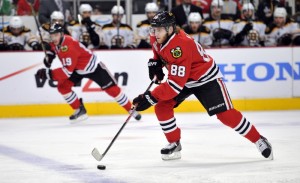Sunday night was a disturbingly stark representation of all that is wrong with hockey in 2014.
The scene was Chicago’s United Center, a building that has achieved nearly iconic status not only because of its tenant Blackhawks’ recent success, but also the team’s capacity to entertain. The Blackhawks make their hay on skill and speed, generally held to be two of hockey’s most exciting elements.
It is a strange sight indeed, then, to see the pace of a Blackhawks game slow down to something resembling a slog through a swamp. But such was the reality Sunday, a 2-0 win for the visiting Nashville Predators that had many local fans dozing off in their seats throughout.
The Problem
Entertainment value, of course.

Chicago losing was not itself what made the game boring. This is not a matter of team preference, partisanship, or bias so much as it is an (attempted) objective examination of what NHL hockey often becomes when one team has a lead. In this sense, we can consider the Chicago and Nashville matchup to merely be a conveniently accessible micro-portrayal of a much larger trend.
The trend I speak of is the obstruction-laden, action-absent dreck that increasingly characterizes the league’s product year after year. A corollary of this is a game bereft of scoring chances, which most would argue are (ideally) the chief source of excitement in hockey.
To get at another point, the chief driving force behind attaining a scoring chance is skill. This is a simplification, but for our purposes it will do; an NHL product rife with uncalled interference and with a pace slower than a drugged snail simultaneously squeezes the importance of skill and dries up the game’s watchability.
Let us return to the Blackhawks and Predators.
Q on the Preds: "They get the lead, they go into a check-fest, and they checked well." #Blackhawks
— Tracey Myers (@Tramyers_NHL) March 24, 2014
While keeping the game fun to watch is obviously not on Joel Quenneville’s list of concerns, he is here alluding to precisely what I have been discussing.
It has become far too easy to make a one or two-goal lead nearly insurmountable. There has been an apparent de facto revision to what merits a penalty, especially interference — a topic I have covered in the past. It isn’t the decrease in power plays that is the problem; rather, it is the change in the game itself that occurs as a consequence of referees’ being less strict with their whistles. Obstruction has returned to the game in force, and it gets more noticeable with every year the league puts between itself and the rule-revolutionizing 2004-05 lockout.
NHL Entertainment Problem: The Upshot
The inevitable result of a dull product is a waning fan base. In the concourse of the United Center after Sunday’s game, a Predators fan and I struck up a conversation. The subject, hockey-centric to begin with, eventually turned philosophical.
“Do you think a casual fan who tuned into the game tonight would have enjoyed it enough to want to watch another?” the fan asked.
He knew the answer before uttering the first word of the question.
Of course not. The game was so thoroughly devoid of intrigue that it essentially mocked the fans who paid to see it. The amount of legitimate scoring chances that Nashville and Chicago racked up during the 60 minutes of game play could have been counted using the fingers on Jaime Lannister’s right hand.
The NHL — and by extension, hockey in general — suffers if the on-ice product is uninteresting. If this issue is continued to allow to fester, it is only a matter of time until the business ramifications manifest themselves.
NHL Entertainment Problem: The Solutions
An NHL-mandated renewed focus on penalizing obstruction would go a long way towards solving the entertainment quandary. It is senseless for the league’s refereeing standards in practice to differ from how they are laid out in the rulebook, especially when said rulebook was crafted in 2004-05 with the primary intention being to speed up a game that had gotten unbearably slow (sound familiar?).
Contraction is another option, albeit an immensely unlikely one. That the NHL has spread its talent too thin is a neither unreasonable nor uncommon supposition. If my entertainment-based arguments don’t seem too appealing, there exists significant economic justification for contraction as well.
The future is unclear, but hopefully it will bring change. A more exciting NHL is a win for all.
Follow Sean Sarcu on Twitter or add him to your network on Google.